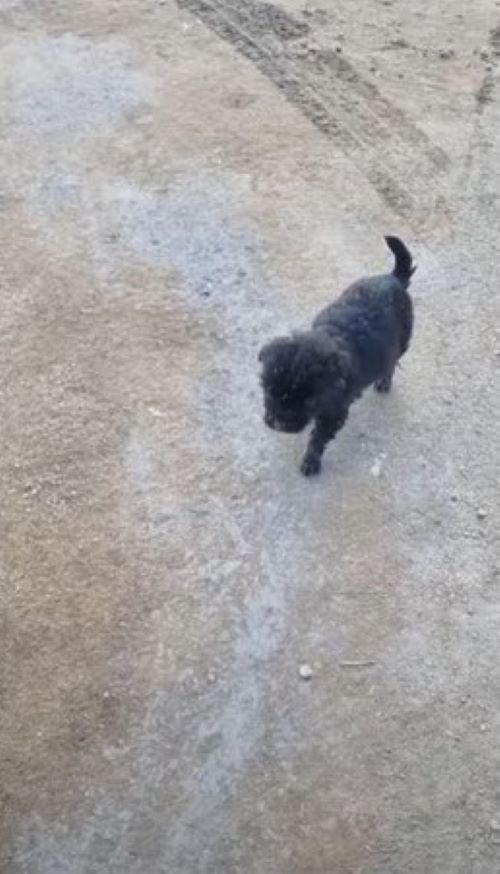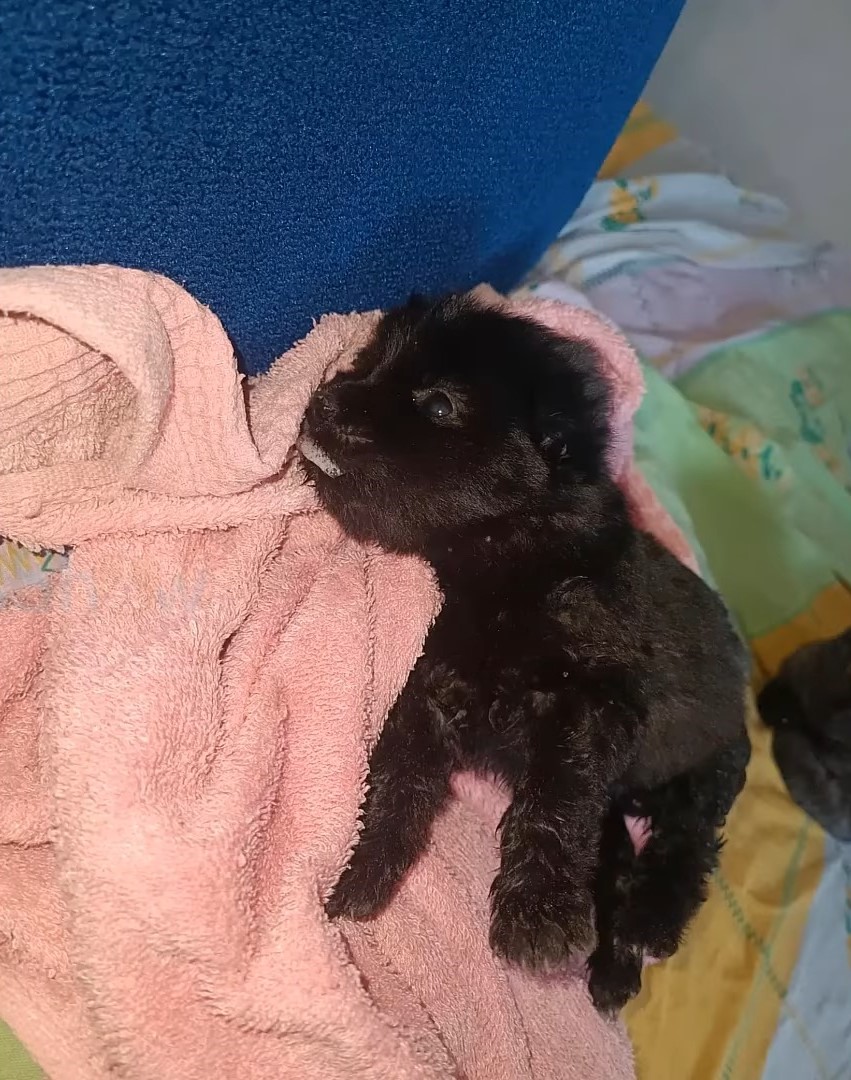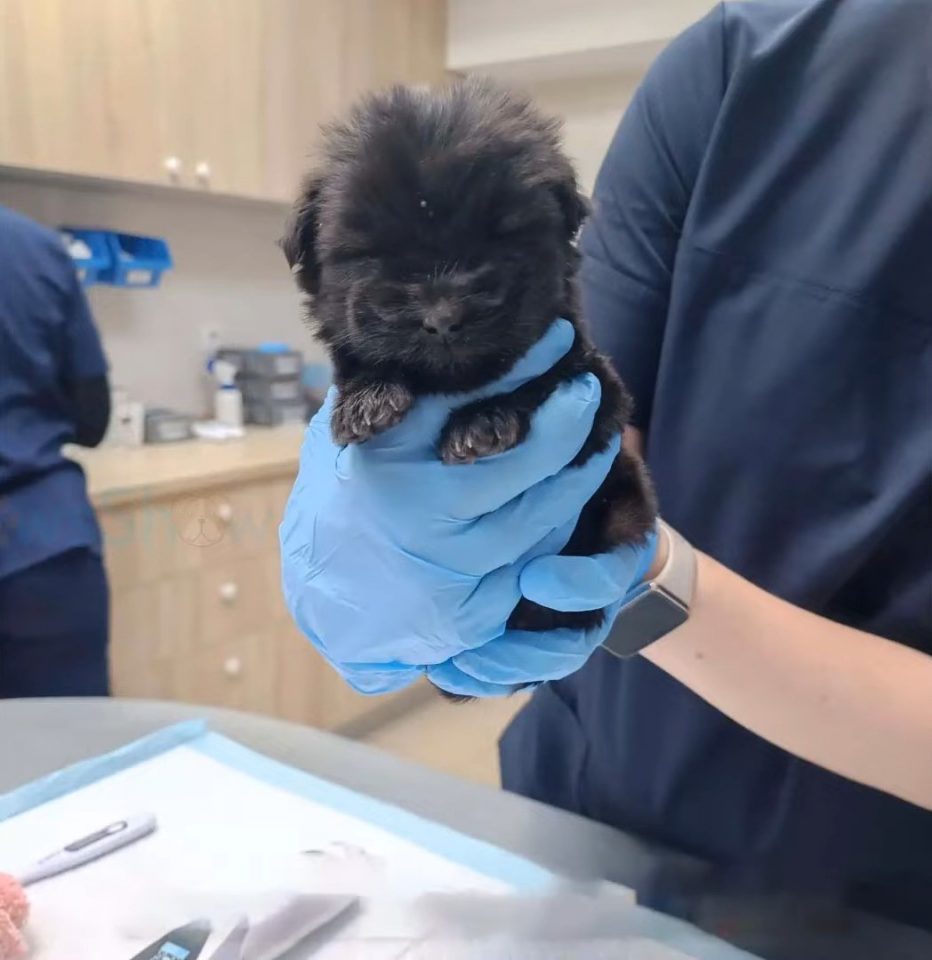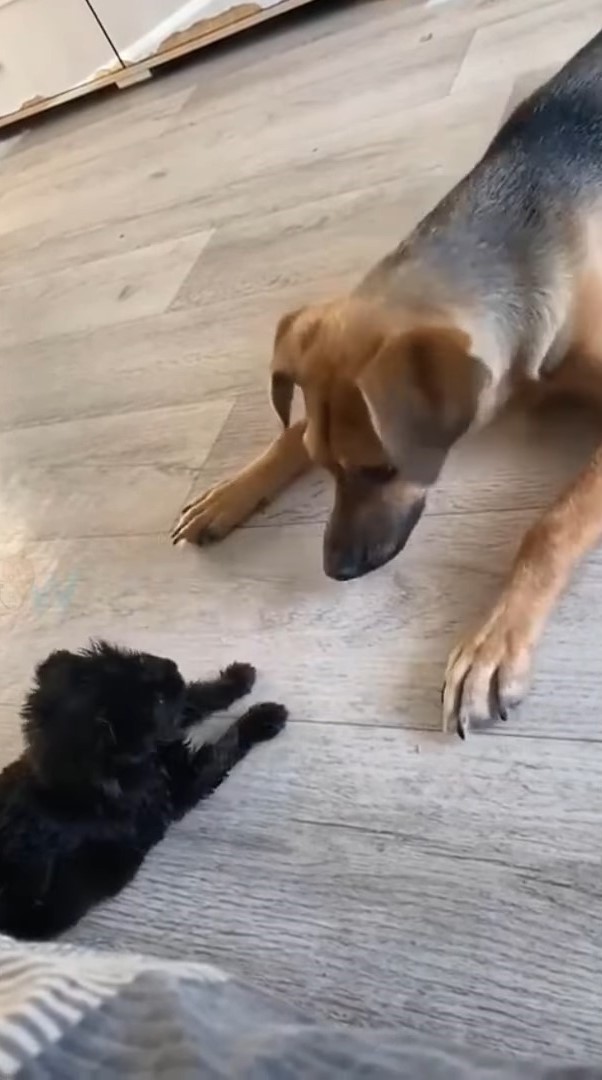Sadly, there’s an increasing number of puppies around the world being dumped on the street by irresponsible owners without giving it a second thought.
It is not only completely inhumane, but it also aggravates the existing challenges faced by animal shelters, such as overcrowding and limited resources.
This tiny puppy, only two weeks old, was dumped on a high-traffic street by someone who didn’t want him anymore.
Fortunately, someone spotted the tiny pup crying and decided to call an animal rescue for help.
Saved Just In Time

When the rescuers arrived, they found the tinniest little puppy who had just opened his eyes, struggling to navigate the busy street.
The poor baby was disoriented, confused, and very scared. He was wobbling right next to the road, and it was just a miracle that a car didn’t run him over.
Since he was so young, he was unable to eat by himself, so he kept crying for his mother.
If the rescuers hadn’t shown up, he surely wouldn’t have survived much longer.
So, the puppy was rescued and taken to a safe and warm place, but it was only then that they learned the situation was much worse than they initially thought.

He was constantly having strange seizures, and it almost looked like epilepsy. It was so heartbreaking to see him suffer like that.
The baby continued to cry non-stop – he wouldn’t eat anything and almost didn’t have any swallowing reflex.
Everyone started to fear for his life, so they rushed him to the veterinary clinic. In addition to weighing only about 20 ounces, the baby had a high fever.
The Road To Recovery

It was hard for the vets to properly examine the baby because of his small size, but they did everything in their power to help the precious pup.
He stayed at the veterinary clinic for five whole days until his condition was finally stabilized and he could be discharged.
Although they couldn’t diagnose him with any condition, the seizures thankfully stopped and did not happen again.

Once he was released from the clinic, the baby – now named Blueberry – went to a temporary foster home.
His foster parents gave him the best care possible and he was thriving. Blueberry even had a furry friend to play with who was very gentle around his tiny foster friend.

After just a couple of days at the foster home, Blueberry’s health improved very much. He was no longer a little crying baby, but a happy and playful bundle of joy.
He will stay in the foster home for a little bit longer, and when he is old enough, hopefully, he’ll go to his forever home.
After everything Blueberry went through in his short life, he deserves only joy and happiness from now on.
If you’ve ever wondered why your furry friend showers you with endless licks, you’re not alone. Dogs have a unique way of communicating their affection, and licking is often their go-to method. This behavior can leave you feeling loved, puzzled, and maybe even a little soggy at times.
Understanding Canine Licking Behavior
The Science Behind Licking
Dogs’ licking behavior is rooted in their puppyhood. When puppies are born, their mother licks them to clean them and stimulate them to breathe. This licking action releases endorphins in both the mother and the puppies, creating a bond between them. As dogs grow, licking becomes a way to show affection, respect, submission, and to seek attention. It’s their way of forming connections and communicating with you.
Licking as Dog Communication
Licking is a form of dog communication. Dogs use their sense of taste, touch, and smell to convey various messages when they lick you. It can signify submission, respect, and admiration. If your dog licks you when you arrive home, it’s to show they missed you and are happy you’re back. It’s their way of showing love and strengthening the bond between you both. So, next time your furry friend showers you with kisses, remember it’s their unique way of expressing their emotions towards you.
Common Reasons Your Dog May Lick You
Affection and Bonding
Dogs lick you as a way to show their affection and strengthen the bond between you. It’s a behavior they learn from their early days when their mother licked them to create a connection. When your dog licks you, it releases feel-good hormones, creating a sense of closeness and love.
Seeking Attention or Rewards
When your dog licks you, it may be their way of seeking your attention or even hoping for a reward. Dogs see licking as a way to communicate their needs to you, whether it’s wanting to play, go for a walk, or simply receive a treat. They learn that licking gets a reaction from you, so they continue to do it to capture your focus.
Tasting Salts and Scents on Skin
Dogs have a keen sense of taste and smell, and when they lick your skin, they are exploring the different scents and tastes they encounter. The saltiness of your skin or the residue of food can be interesting and enjoyable for them. Licking also serves as a way for dogs to gather information about your surroundings and recent activities.
These are some common reasons why your dog may lick you. Understanding the motivations behind this behavior can help you strengthen your bond with your furry friend and improve your communication with them.
Health and Behavioral Factors
Licking as a Sign of Anxiety or Stress
When your dog licks you excessively, it could be a sign of anxiety or stress. Just like how some people bite their nails when nervous, dogs may lick as a coping mechanism for their own worries. If your furry friend licks you more than usual, it could be their way of seeking comfort or reassurance in a stressful situation.
Compulsive Licking and Health Concerns
Compulsive licking behavior in dogs can lead to health concerns. Excessive licking can result in irritation, inflammation, or even injury to the skin. If your dog is compulsively licking themselves or you, it’s essential to address this behavior promptly to prevent any potential health issues. Seeking guidance from a veterinarian can help determine the root cause of the compulsive licking and ensure your dog’s well-being.
Managing Excessive Licking
Training Techniques to Reduce Licking
To address excessive licking behavior in your dog, you can start by implementing positive reinforcement techniques. When your dog licks you excessively, calmly redirect their attention to a chew toy or a fun activity they enjoy. Reward your dog when they engage in the desired behavior, such as playing with a toy instead of licking. Consistency is key in reinforcing the message that licking is not the preferred behavior.
When to Consult a Veterinarian or Behaviorist
If your dog’s excessive licking persists despite attempts to redirect their behavior, it might be time to seek professional help. Consult a veterinarian or a certified animal behaviorist to rule out any underlying medical issues or behavioral problems. They can provide expert guidance tailored to your dog’s specific needs and help you develop a customized plan to address the excessive licking behavior effectively. Remember, seeking timely intervention can prevent potential health issues and ensure the well-being of your furry companion.
Conclusion
Your dog’s constant licking may be a way of showing love, respect, or seeking attention. It could also indicate anxiety or stress. Remember, excessive licking might lead to health problems, so it’s crucial to address it promptly. By using positive reinforcement methods and seeking help from a professional, you can manage this behavior effectively. Consulting a vet or behaviorist will help you understand the root cause and create a tailored plan to ensure your furry friend’s happiness and well-being.
Frequently Asked Questions
Why do dogs lick excessively?
Dogs may lick excessively due to various reasons, such as displaying affection, respect, seeking attention, or indicating anxiety or stress.
How can excessive licking impact a dog’s health?
Excessive licking can lead to health concerns for dogs, such as skin irritation, hot spots, or digestive issues, necessitating intervention from a veterinarian.
What are some ways to manage excessive licking in dogs?
Managing excessive licking in dogs can involve implementing positive reinforcement techniques, offering distractions, and addressing any underlying medical or behavioral issues.
When should I seek professional help for my dog’s excessive licking?
If your dog’s excessive licking persists despite your efforts, it’s crucial to consult a veterinarian or behaviorist to identify underlying issues and create a customized plan for your dog’s well-being.
[no_toc]

Hey there, I’m Janet Brooks, a dog-loving student from California. I’m all about helping pups in need, especially those without homes. Me and my awesome friends work together to give shelter and love to stray dogs. Oh, and I also write blogs about dogs to share helpful info.